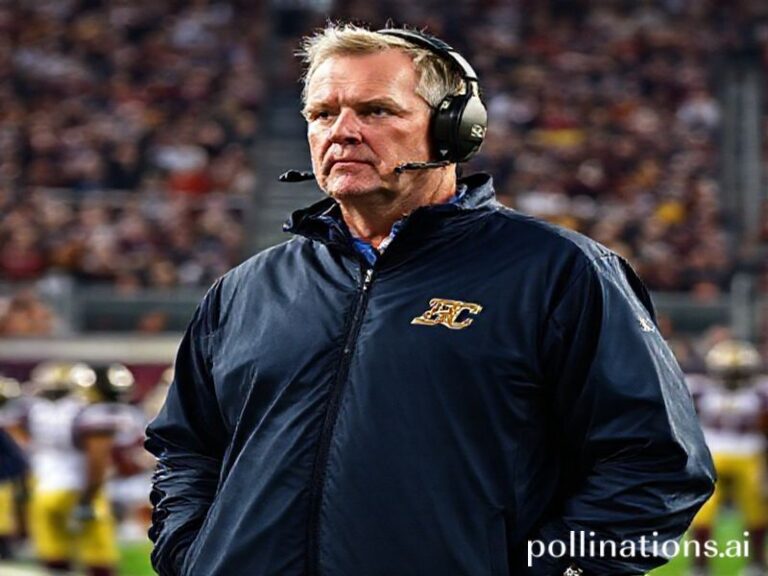Global Football 2024: 90-Minute Escape Pods From Reality, Now With Extra VAR
Football Today: A 90-Minute Distraction From the Collapse of Civilisation, Now Streaming Worldwide
Somewhere between the Arctic ice shelf and the latest cryptocurrency meltdown, 22 millionaires are kicking a $200 ball across a grass rectangle while the rest of us pretend this is still a rational use of planetary resources. Welcome to football in 2024, that grand global ritual where geopolitical tensions, human-rights records, and the climate crisis are politely shelved for two 45-minute intervals—plus whatever extra time the VAR gods demand for their weekly sacrifice of collective sanity.
The beautiful game has become the beautiful screen: 4K, multi-angle, real-time betting overlays that turn every nutmeg into a Nasdaq derivative. In Lagos, a teenager streams Manchester City on a cracked phone while the national grid flickers like a dying star. In Riyadh, Cristiano Ronaldo—now the highest-paid billboard in cleats—waves to crowds whose grandparents once used football stadiums for public executions. Progress, as always, wears fluorescent boots and asks you to download the official app.
Qatar’s 2022 World Cup already feels quaint, a sepia-toned affair when we still believed that a month of sport-washing could be cancelled by a few Guardian exposés. Now the bidding war for 2030 has become a geopolitical auction block. Spain, Portugal, Morocco, and—why not—Ukraine have stitched together a joint bid as if football can triage a war zone. Meanwhile, Saudi Arabia’s PIF quietly earmarks another sovereign fund to buy the concept of midfield pressing outright. The line between club ownership and nation-state branding has blurred so completely that the next Champions League anthem may just be a recitation of quarterly GDP forecasts.
Europe clings to its self-image as the moral guardian of the sport, even as its elite clubs stagger under debt loads that would make a Greek finance minister blush. Barcelona’s economic levers have been pulled so often they now resemble a slot machine in a bankrupt casino. Yet somehow the broadcast rights still fetch billions, because nothing says “healthy society” like spending three hours watching millionaires argue with referees over microscopic handballs while the Amazon burns in the lower-third ticker.
Africa remains football’s great frontier of raw talent and rawer deal-making. European scouts circle Dakar academies like vultures over a watering hole, promising contracts that, statistically, end in unpaid wages and torn ACLs. The continent’s domestic leagues bleed viewers to European feeds beamed in by Chinese satellites, a neo-colonial pipeline lubricated by telecom sponsorships no village team can match. Still, every so often a kid from Abidjan nutmegs a Real Madrid defender and the myth reboots itself: meritocracy in high-definition, available for €14.99 a month.
Asia has discovered the sport’s real value is not on the pitch but in the pixels. China tried buying World Cup dreams with naturalised Brazilians and ended up with a debt crisis and a president who reportedly can’t tell a corner kick from a corner office. Japan and South Korea export industrious midfielders who run harder than their birth rates. And in India, the Indian Super League now boasts such massive crowds that nobody notices the cricket scores scrolling underneath, a cultural coup roughly equivalent to selling ice to penguins.
South America, once football’s romantic heart, watches its brightest stars leave before their voices break. Uruguay’s population is smaller than greater São Paulo, yet still produces enough world-class strikers to stock a FIFA Ultimate Team pack. Argentina’s league is a fire sale with Messi memorabilia thrown in for emotional leverage. Brazil’s domestic calendar has been surgically rearranged to accommodate European TV windows, because nothing says “national sport” like a 1 a.m. kickoff in Manaus so Germans can watch before brunch.
And yet, every Saturday at 3 p.m. GMT, the planet synchronises its heartbeats to a referee’s whistle. Stock markets pause, ceasefires hold, politicians discover they too have “always been a massive fan.” For 90 minutes plus stoppage, the collective illusion holds: that skill still trumps capital, that the underdog might still bite, that the final score is written by feet rather than algorithms. Then the whistle blows, the ads roll, and the world remembers it is on fire—until Tuesday, when the Champions League anthem plays and we all agree to forget again.







